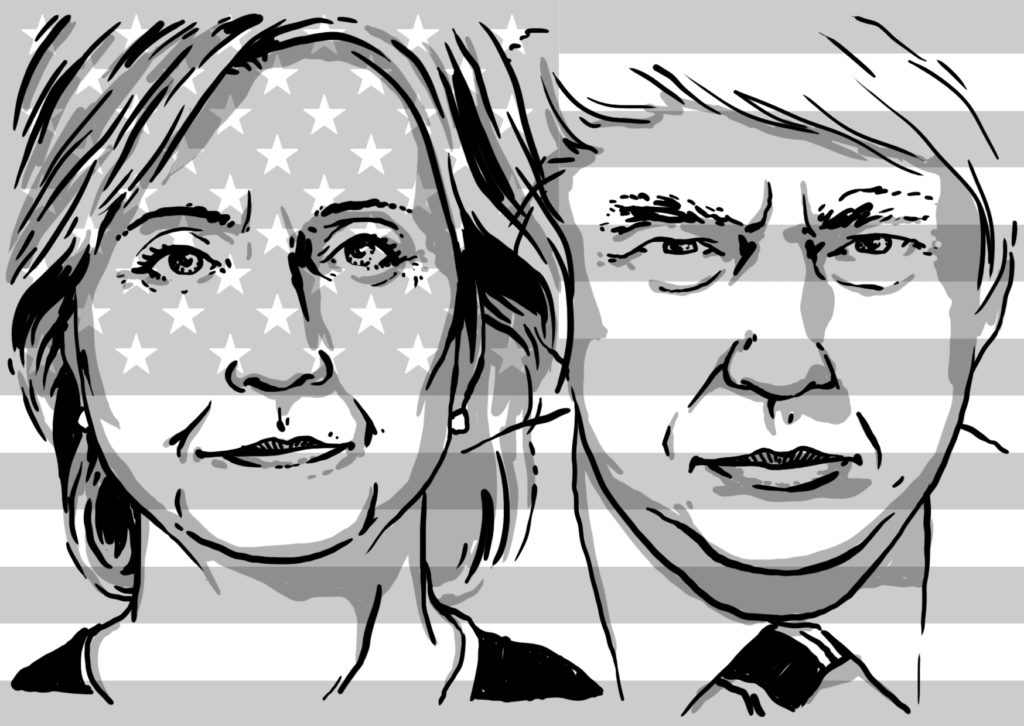This year’s US Presidential Election continues to throw gender stereotypes and sexism onto the spotlight, not least because it’s the very first time that a female candidate has been put forward. Klara Marie Schröder, one of the Executive Editors of The Governance Post, approached Dr. Juan Diaz- Prinz, Lecturer in Gender, Diversity and Conflict at the Hertie School, for his views.
Hillary Clinton is making history as the first female presidential candidate in the United States. Why do you think it took the US so much longer than other (Western) countries to nominate a female candidate?
Running for President of the United States is an extremely gruelling process. It can be daunting even for the country’s most politically astute politicians. We have seen many men try and fail. The current election cycle shows us that anyone can be nominated for President if they can survive the scrutiny of the people, the media, and the many donors. The fact that a woman hasn’t been nominated yet is simply a reflection of the challenges women face in general. Still today, too few women are in top management or political positions. It is not surprising that when they seek the presidency, they get weeded out very early in the process. According to the Center for American Women in Politics, there have been only 37 women elected or appointed as governor. If you look at the electoral history of Congress and state legislatures, the percentage of women elected hovers at around only 20%. Additionally, the US electoral system is a bipolar system, making it extremely difficult for any outsider to make it through, whether on the grounds of gender, ethnicity, language, or religion. When an American makes a decision to vote for a candidate, he/she calculates the impact of his/her vote. As a consequence, we have had very good third party candidates, but they’ve had a very difficult time and have also not made it. Part of the problem is that we have one party that professes to be based on “family values” and quite often those family values foresee a secondary and more domestic role for women. As long as the Republican Party does not prioritise gender equality and the appointment of women into important positions, you will continue to see women struggling to advance in the system. This is because the country is divided more or less 50-50 along the two parties. It’s no wonder that the woman who finally made it is already accomplished, with experience close to the presidency, as a Senator, as a Secretary of State, and as a mother and grandmother.
Hillary Clinton told the blog Humans of New York that “What works for them [men] won’t work for you [women]. Women are seen through a different lens. It’s not bad. It’s just a fact.” How do you think her campaign strategy was influenced by the fact that she is a woman?
For a very long time in American society, if you wanted to stop a woman, you accused her of playing the “woman” card. In fact, often women feel they have to adopt “masculine” behaviors in order to be appointed or elected to any leadership position. But if you look at the women who have been successful, such as Anne Richards of Texas, it was not because they pretended to be more like their male counterparts. It was because they fully embraced their womanhood and showed that they could be a woman in a man’s world. Therein lies the dilemma for women: how much do they develop a strategy that plays to their natural strengths and how much do they try to fit into the majoritarian dominant social order? The fact that Donald Trump has been not only vulgar towards women but has shown little regard for women voters had made it easier for Hillary Clinton to embrace the argument that she will be the first female President. When one looks at Clinton’s career path, she has evolved from her resistance to being judged only as a woman in politics, to becoming a self-confident person who will do things differently precisely because she is a woman. The interesting aspect of this is that despite her embrace of her female side, we might be surprised to see that she will be no different from her male predecessors.
What role does gender play in the public image Donald Trump has created of himself?
Given what has happened over the last two or three weeks regarding Donald Trump’s image, we can see that he has a major gender issue. Donald Trump prides himself on being blunt, an outsider and a maverick. He appeals to the alpha male idea, not only in his choice of partners but in the way he presents himself. It might be that he thought he could build political capital from his playboy image. Let’s face it, quite often in American society sex sells. Articles, advertisements, movies, music, and theater all seek to capitalize on individual sexual appeal. Unfortunately for Donald Trump, given the long list of women who are coming forward, it is beginning to have a negative effect in deeply conservative areas where family values and sexual restraint are important, for example in the Bible Belt, Utah, and even Texas, where conservative values requires, at a minimum, that one does not flaunt philandering. His inability to at least attempt to conform to these social norms might cost him the election.
To which extent do you think gender stereotypes play a role in how each candidate is perceived?
At the beginning of the electoral cycle, there was a clear bias towards Hillary Clinton, and Donald Trump was perceived in a positive light for his alpha male approach. I find it interesting that Hillary Clinton is being accused of murder, treason, and even defending rapists. At the same time, Donald Trump’s philandering and womanizing have somehow put him on a pedestal in the eyes of his own supporters. People who profess to be worried about the moral decay of the country forgive this man for his sexual exploits if they believe him to be a “top soldier” ready to destroy ISIS. At the same time, a woman who has been working on defeating ISIS over the last few years will not be forgiven for standing by her husband when he cheated on her with a White House intern. In this example, we see that the alpha male who was “successful” both in his personal life and work is somehow valued more highly than a woman who was successful at work but is seen as “failing” in her marriage. At the same time, these very stereotypes have boosted Democrats’ motivation to get out and vote. I think that right now, more than ever before, Democrats, Independents, and moderate Republicans are determined to ensure the United States elects its first female President.
Donald Trump has made a lot of offensive comments about women. To whom is he trying to appeal, with such comments? What do they say about the greater discourse on gender and women’s rights in the US?
To be honest, the whole discourse currently going on with Donald Trump is very distasteful and humiliating for the American public. As far as I can see, most people would like it all to go away. For Republicans who want to govern, their worst nightmare has come true. It must also be absolutely humiliating for Hillary Clinton to be forced to debate for the highest political office of the nation with a person who has little regard for women and has no sense of civility. In terms of the greater discourse on gender in the US, I hope this will open up space to talk about what is appropriate in politics and media. It is very unfortunate and disconcerting that America’s mainstream media seems to think that it’s okay to toss around the “p” word in every other sentence. I think we will be discussing this election cycle for years to come, especially if Hillary Clinton is elected President.
Do you feel that gender stereotyping played a role in the perception of the first presidential debate?
Yes, I did. Actually, I think it was the beginning of the end of Donald Trump’s campaign. More importantly, the way that Hillary Clinton handled Donald Trump’s attacks has been highly gendered. Her ability to remain calm, and not to play the alpha male game, won her a lot of credibility with most people (right-wing conservatives excluded). This is very telling, because she had to balance being perceived as a woman, responding as a woman, and at the same time being stronger than her alpha male counterpart at every point. At the same time, everyone was treating Donald Trump as, “Oh that’s just Donald Trump being Donald Trump”. If Hillary Clinton were to speak the way Donald Trump did, her career would have been finished. Not only did it play a role in the first Presidential Debate, it was significant in the second, and unfortunately it will be a main source of contention in the third.
Do you think men and women have different leadership styles? Can we expect any changes with a woman in the White House?
I’m not a big fan of talking about different leadership styles based on gender. However, I do believe that any person who has different real-life experience from what leaders usually have will bring in, by default, a different style. The problem that any newly elected President has is the gap between de facto presidential power and perceived power. The US President’s power is based on the so-called bully pulpit: the moral power to move Americans to do the right thing. Until now, this power has been defined by a masculine understanding of power. Whether Hillary Clinton chooses consciously to take a different approach or whether she chooses to embrace what has worked for others in the past, may have to do more with the reception she receives in Congress. We saw how President Barack Obama tried to take a different approach in the early years of his presidency and it did not work. He tried to be more problem-solving and conciliatory towards the Republican Party, only to be met by constant opposition and resistance. As a result, over the last eight years he evolved into a much more confrontational President. Having said that, I believe Hillary Clinton will definitely bring her own approach, based on her experiences as a woman at the center of political power, who has held different political offices and has been First Lady. If she does get elected, she will set a precedent, and how she leaves the office will have a major impact on whether the political parties will embrace gender equality in politics. I am convinced that she will distinguish herself from her male predecessors and leave an indelible mark on American society.
 Dr. Juan Diaz– Prinz is a mediator, trainer and facilitator working on political, economic and social integration. He is the Founder of INGROUP Berlin and teaches international mediation and strategic negotiations at several European universities with an interactive experiential learning approach. Over the last 15 years, Juan has dedicated his work to peace-building in regions such as South Eastern Europe, South Asia and North Africa. In 2005 he co-founded the CSSProject for Integrative Mediation and served as its Director and Chairperson from January 2005 to May 2012. In this capacity, he oversaw the development of the interactive problem-solving methodology and developed the use of interest-based negotiations in workshops with political leaders in divided communities. He also has worked on developing the concept of multitrack peace mediation in post
Dr. Juan Diaz– Prinz is a mediator, trainer and facilitator working on political, economic and social integration. He is the Founder of INGROUP Berlin and teaches international mediation and strategic negotiations at several European universities with an interactive experiential learning approach. Over the last 15 years, Juan has dedicated his work to peace-building in regions such as South Eastern Europe, South Asia and North Africa. In 2005 he co-founded the CSSProject for Integrative Mediation and served as its Director and Chairperson from January 2005 to May 2012. In this capacity, he oversaw the development of the interactive problem-solving methodology and developed the use of interest-based negotiations in workshops with political leaders in divided communities. He also has worked on developing the concept of multitrack peace mediation in post
 Klara Marie Schroeder is Executive Editor of The Governance Post and a second-year public policy student at the Hertie School of Governance.
Klara Marie Schroeder is Executive Editor of The Governance Post and a second-year public policy student at the Hertie School of Governance.
